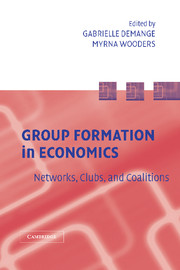Book contents
- Frontmatter
- Contents
- List of Contributors
- Introduction
- PART ONE NETWORK FORMATION, COMMUNICATION, AND LEARNING
- PART TWO ON EQUILIBRIUM FORMATION OF GROUPS: A THEORETICAL ASSESSMENT
- 5 Group Formation: The Interaction of Increasing Returns and Preferences Diversity
- 6 Games and Economies with Near Exhaustion of Gains to Scale
- 7 Coalitions and Clubs: Tiebout Equilibrium in Large Economies
- 8 Secession-Proof Cost Allocations and Stable Group Structures in Models of Horizontal Differentiation
- PART THREE GROUPS, CLUBS, ALLIANCES IN POLITICAL AND ECONOMIC ENVIRONMENTS
- Index
7 - Coalitions and Clubs: Tiebout Equilibrium in Large Economies
Published online by Cambridge University Press: 02 February 2010
- Frontmatter
- Contents
- List of Contributors
- Introduction
- PART ONE NETWORK FORMATION, COMMUNICATION, AND LEARNING
- PART TWO ON EQUILIBRIUM FORMATION OF GROUPS: A THEORETICAL ASSESSMENT
- 5 Group Formation: The Interaction of Increasing Returns and Preferences Diversity
- 6 Games and Economies with Near Exhaustion of Gains to Scale
- 7 Coalitions and Clubs: Tiebout Equilibrium in Large Economies
- 8 Secession-Proof Cost Allocations and Stable Group Structures in Models of Horizontal Differentiation
- PART THREE GROUPS, CLUBS, ALLIANCES IN POLITICAL AND ECONOMIC ENVIRONMENTS
- Index
Summary
Introduction
A central problem in public economics is how to achieve optimal outcomes through price-based mechanisms in economies with public goods. One of the key papers in this area is Samuelson (1954), which provides a formalization of Lindahl's approach. Unfortunately, the implied system of personalized prices requires agents to reveal their preferences for public goods truthfully. As Samuelson notes, an agent may therefore have an incentive to misrepresent his true preferences. Thus, it is doubtful that market mechanisms based on the Lindahl prices defined by Samuelson would generally be able to provide public goods efficiently.
In response, Tiebout (1956) argued that many types of public goods are subject to crowding and congestion, resulting in the possibility of their provision by local jurisdictions rather than national governments. Jurisdictions offering consumers various bundles of public goods can condition residence in the jurisdiction (and therefore consumption of the public goods) on the payment of taxes. Thus, agents in effect are forced to reveal their willingness to pay for public goods through their locational choice. Tiebout asserted that, in “large” economies, when localities compete for residents and agents, in turn, “vote with their feet” to express demand for public goods, such goods will be efficiently provided.
Tiebout (1956) stimulated a large theoretical investigation. Subsequent researchers have shown that, although efficient Tiebout sorting may not occur in completely general circumstances, adding economic restrictions that are natural in the study of clubs or local public goods provides support for Tiebout's hypothesis.
- Type
- Chapter
- Information
- Group Formation in EconomicsNetworks, Clubs, and Coalitions, pp. 246 - 265Publisher: Cambridge University PressPrint publication year: 2005
- 4
- Cited by



